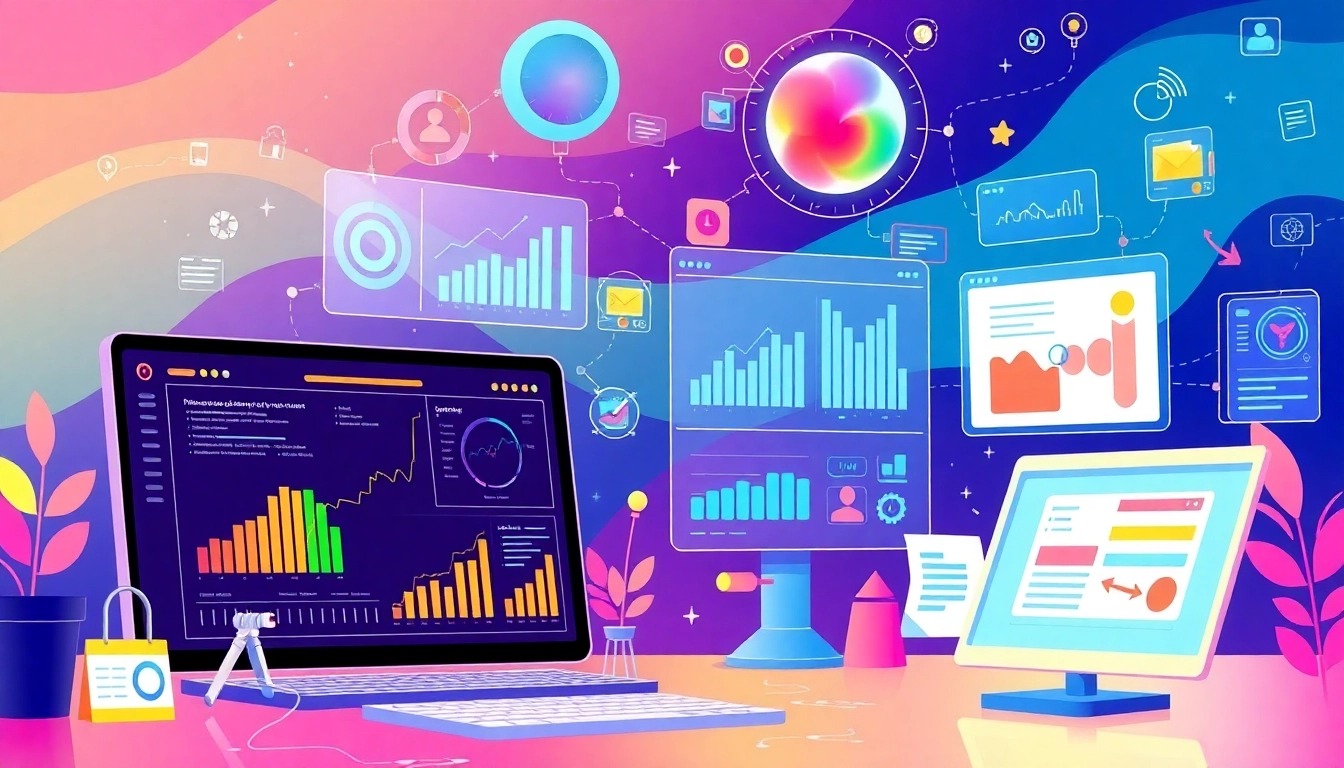Understanding AI Marketing Tools
What Are AI Marketing Tools?
AI marketing tools are software applications that leverage artificial intelligence technologies to enhance various marketing processes. These tools automate tasks and provide advanced insights into consumer behavior, enabling marketers to make data-driven decisions. The prevalence of these tools is rising as businesses seek to improve efficiency and gain a competitive edge in a saturated market. As enterprises strive to harness the power of AI, understanding how to utilize AI marketing tools effectively becomes essential for success.
The Role of AI in Modern Marketing
The integration of AI in marketing signifies a revolutionary shift in how brands interact with consumers. AI technologies such as machine learning, natural language processing, and data mining allow marketers to analyze large data sets rapidly and derive insights that would be difficult and time-consuming to achieve manually. This capability leads to more personalized experiences, targeted advertising, and optimized campaigns that can adapt in real-time to changing consumer preferences and behaviors.
Common Features of AI Marketing Tools
Most AI marketing tools share a set of core features designed to enhance marketing efforts. These include:
- Automation: AI tools automate repetitive tasks, freeing up time for marketers to focus on strategy.
- Analytics: They provide deep insights into customer behavior, campaign performance, and market trends.
- Personalization: AI algorithms can tailor marketing messages and content to individual customers based on their preferences and prior interactions.
- Predictive Analysis: By analyzing historical data, these tools can forecast future behaviors and outcomes, enabling proactive marketing strategies.
- Real-time Monitoring: Many AI tools can track performance metrics in real-time, allowing for quick adjustments to campaigns.
Benefits of AI Marketing Tools
Enhancing Customer Engagement
One of the most significant benefits of AI marketing tools is their ability to enhance customer engagement. These tools can analyze user interactions across various channels, helping marketers understand what content resonates most with their audience. For example, AI-powered chatbots are increasingly used to provide instant customer support, guiding users through their inquiries and improving overall customer satisfaction. This 24/7 availability creates a seamless and engaging experience for users, ultimately leading to loyal customers.
Streamlining Marketing Processes
AI marketing tools streamline marketing processes by automating various tasks such as email segmentation, social media scheduling, and lead scoring. Automation reduces the need for manual oversight and allows marketing teams to operate more efficiently. For instance, tools like HubSpot and Mailchimp utilize AI to optimize email campaigns by predicting the best times to send messages based on user engagement patterns, effectively improving open and conversion rates.
Improving Data Analysis and Insights
Data-driven decision-making is at the heart of effective marketing strategies. AI tools can analyze vast amounts of data to uncover valuable insights about customer behavior and preferences. This capability allows marketers to identify trends and patterns that would otherwise go unnoticed. Tools such as Google Analytics and SEMrush provide actionable insights that can guide content strategy, advertising spend, and overall marketing tactics, ensuring that resources are allocated effectively.
Top AI Marketing Tools to Consider
Chatbots and Customer Support Tools
Chatbots have rapidly become a staple of customer service in modern marketing due to their ability to provide instant answers to customer queries. Tools like Intercom and Drift utilize advanced AI algorithms to learn from customer interactions, improving their responses over time. This technology not only enhances user experience but also gathers data on customer preferences, which can inform future marketing strategies.
Content Creation and Management Tools
With the growing demand for content, AI tools for content creation and management have gained traction. Platforms like Jasper and Copy.ai utilize natural language processing to generate high-quality written content in a fraction of the time it would take a human. These tools can help marketers create blog posts, social media updates, and ad copy tailored to their audience’s interests, saving time and resources.
Analytics and Performance Tracking Software
AI-driven analytics tools such as Tableau and Google Data Studio enable marketers to interpret complex data sets visually. These platforms allow for real-time tracking of key performance indicators (KPIs), ensuring that businesses can pivot their strategies quickly based on performance insights. By employing these tools, marketers can better understand campaign performance, customer journeys, and market dynamics.
Integrating AI Tools into Your Marketing Strategy
Assessing Your Business Needs
Before integrating AI tools into your marketing strategy, it’s crucial to assess your business’s specific needs. Consider which marketing processes are most time-consuming or cumbersome and evaluate how AI can alleviate those burdens. For instance, if your team struggles with social media engagement, investing in AI tools that automate posting and enhance user interaction can be highly beneficial.
Choosing the Right Tools for Your Team
The market is saturated with AI marketing tools, making it essential to choose the right ones for your business. Look for tools that align with your goals and the specific challenges you face. Evaluate factors such as ease of use, integration capabilities, scalability, and customer support before making a decision. Also, consider engaging with trial versions or demos to understand how a tool would fit into your existing workflows.
Measuring Success and ROI
After the implementation of AI marketing tools, it’s crucial to measure their impact and return on investment (ROI). Establish clear KPIs and metrics to evaluate the effectiveness of these tools on your marketing campaigns. Regularly assess performance data to determine if the investment in AI technology is yielding positive outcomes, and make data-driven adjustments as needed.
Future Trends in AI Marketing Tools
Emerging Technologies in Marketing
The landscape of AI marketing is continuously evolving, with new technologies emerging that promise to further revolutionize the field. For instance, advancements in machine learning and natural language processing are leading to smarter algorithms that can predict consumer behavior with even greater accuracy, enhancing personalization efforts. Additionally, augmented reality (AR) and virtual reality (VR) are beginning to find applications in marketing, providing immersive experiences for users.
Potential Challenges and Considerations
Despite the benefits, integrating AI into marketing strategies also presents challenges. These can include data privacy concerns, the need for significant investment, and the potential for technology to replace human jobs. It’s crucial for businesses to navigate these challenges thoughtfully, ensuring compliance with regulations and maintaining transparency with users about how their data is used.
Preparing for AI Advances in Marketing
To stay competitive, businesses must remain adaptable and prepared for future advances in AI technology. Continuous learning and training for marketing teams will be essential to harness the full potential of these tools. Furthermore, businesses should consistently evaluate their strategies and adapt to the changing technology landscape, ensuring they leverage the latest advancements in AI for marketing success.



